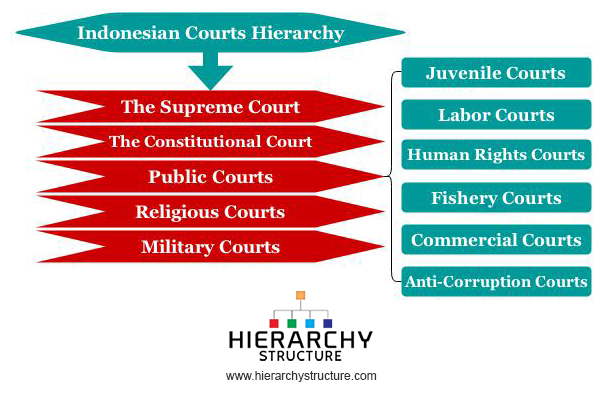The Judiciary system in Indonesia is one which mainly comprises of the Supreme Court of the country as well as the constitutional court of the country. There are also many other types of courts such as the military courts, public courts, religious courts, Administrative courts etc., all with different functions, powers and responsibilities.
There is a structure of hierarchy among these courts which means that the one at the top of the pyramid of hierarchy is the one with the maximum power and responsibility. As the pyramid moves lower, the responsibility etc. keeps decreasing. The following is the hierarchy structure followed in the courts of Indonesia.
 The Supreme Court
The Supreme Court
In Indonesia, the Supreme Court comes at the topmost position and is the highest court in the country. This apex court is the final court for appeal for both civil and criminal matters and verdicts. This court also resolves the disputes between other courts of the country. The Supreme Court in Indonesia is headed by the Chairman.
The Constitutional Court
At the second position in the hierarchy of courts in Indonesia comes the Constitutional court which is responsible for ruling over disputes that concern the constitution of Indonesia as well as those kinds of matters that are related to political parties and elections.
Public Courts
Next in the line of the hierarchy of courts in Indonesia come the Public courts which comprise the district courts at the first level and then the high courts at the appellate level. Once the case goes on through these levels, it goes to the Supreme Court. The public courts in the country can try criminal cases civil and criminal cases which involve the Indonesian citizens or the foreign citizens.
States courts have jurisdiction at the regency and city level whereas the high court’s function at the provincial level. There are other specialized courts in this category as well and they are given as follows:
- juvenile courts
- labor courts
- human rights courts
- fishery courts
- commercial courts
- anti-corruption courts
Religious Courts
Religious courts are meant for the Muslim citizens in order to resolve matters such as marriage, property and inheritance. These courts are located at the district or municipality level.
Administrative Courts
These courts rule in the matters of dispute which involve the state officials or bodies which are at the center level and regions.
Military Courts
These courts deal with those cases that are involved with the members of military forces.
